Gendûet Seat of Judgement
Seat of Judgement Gendûet
"Of Gendûet, 'Neren ist vilicio, non naræn.' — the designation of an office, not of a nature"
The Seeds of Darkness
It is said that in a place and time prior to time and space, Vahan began creation. And the first of things to be made were the gods and their servants. The gods were splendid anrd good, and for a time all things were good. But Gendûet oft delved into the Void, and in his lonesomeness he believed himself to be the Lonesome; set apart from all things. Thus a rift was beheld, and Gendûet thought to himself that he was indeed different, and great. But he held these thoughts in his heart, and the gods still believed him to be their brother.
When the time of descent came to be, and the gods and the assorted hosts readied themselves to build a world from the darkened waste, Vahan took Gendûet aside and whispered in his ear. At their final parting, it seemed as if the dreadful Doom Gendûet had set for himself had settled. For Vahan's words had set a great fear in the god, and he feigned to himself that he would change his course and be content with being but one god among the many. But as the great labor of the gods began and the valleys were delved and the hills were raised, and the basins were filled with the seas and the great mountains were set as lofty proclamations, a lust grew within the Seat of Judgement, and he desired all these things to bow and call him 'Lord'. His black desire grew to its utmost when the Elves first appeared. They appeared at the end of the gods' labors.
The Coming of the Elves
Êa síra elin sû e-govaned! They are dying; but it has been foretold.
The cliffs of Adarnäule and its breaking clods of earth mixed with the foam of the sea crashing upon the shore of Ren ê Taule, and into this mixture Vahan exhaled his Spirit of Life, and the mixture became the Elves: the Firstborn. The Elves awoke and saw above them the wheeling constellations -- and in those days the stars were still young and brightly lit. The Elves made for themselves a language, and they called themselves a name that is now lost, but meant 'the Beloved Amidst Innumerable Stars'.
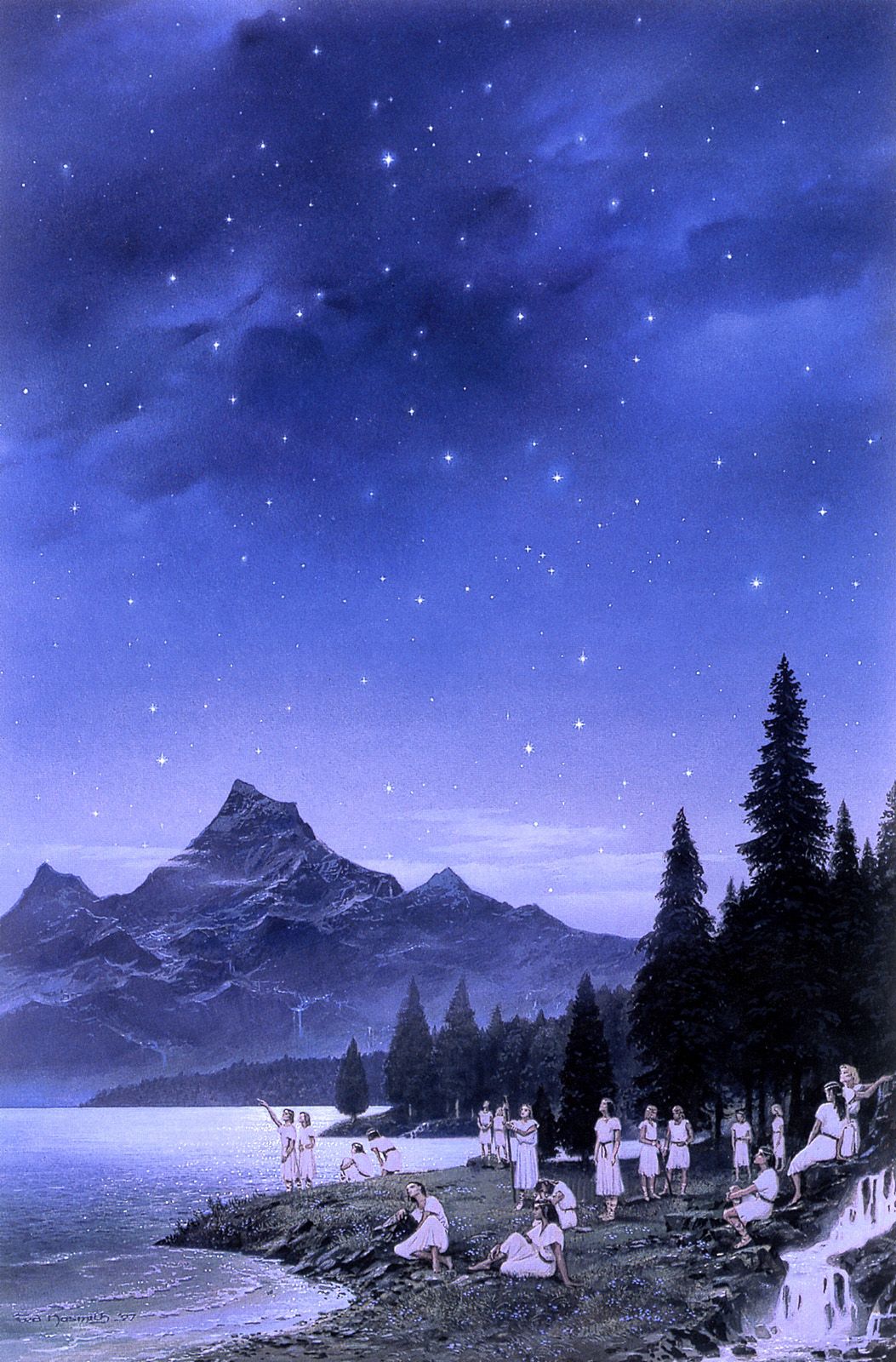
It was soon after their creation that the Elves separated, and they spread across the earth and were fruitful and multiplied. The gods soon learned of these strange new creations, which they had foreseen only a little of in Heaven, and they longed to be with them. So Hundimar told Velziel and Hod to gather their greatest runners, and to find and to bring all the Elvenfolk to Boryen where the gods lay in rest. Netzach, Solitude and Power of Endurance, lead the assembly of runners, and they went across the face of the earth over all terrains and gathered all the Elves that would come. And most Elves, when they saw the gods in their glory and majesty, felt love stirred in their hearts and would quickly accept. But Gendûet had begun his dark designs, and when the gods had counseled on what to do with the Elvenfolk he had already set his evil purposes upon the world. This was among the worst deeds done by Gendûet. He sundered a nascent people, forever.
Many Elves were dogged by his shadowy presence or his evil spirits, and, when the runners of the gods appeared to them, they rejected the gods in fear, for they had sensed their brother's dark presence, and assumed all the gods to be the same. These are the Ava'lman: the Lost Elves. And they have never seen the glories of Boryen.
The gods were unsure why some Elves rejected their offer and gift. They were as yet untouched by evil stain, and were still young. They did not know of dark designs, and their minds were as yet clean of the wearies of evil. So they thought it to be an unmarred and free choice of the Elves.
Masks of the Gods
It was shortly agreed upon that the gods should bear masks in the presence of the Elves, for the Elves were as of yet unable to see the gods clearly without great pain, and the gods could not speak with the Elves unless they hid themselves somewhat -- their words were too great for the Elven ears. So the Elves first saw the gods in their diminutive forms, but they were still awful and beautiful to behold. And, for a time, all things were good. The Elves, if they inquired about the masks, were answered kindly by the gods as to why the gods could not reveal themselves. There the Elves grew in full stature and strength. They became mighty in craft and word. And various clans were formed among the Elves, led by great lords. The time of peace lasted for a very long while, but times of peace are quick to pass in memory, and so we will not entreat of those misted times, here. And all the while Gendûet wrought his shadowy designs, and the gods yet thought of him as brother and ally.
Lies Told to the Elves
But he that sows lies in the end shall not lack of a harvest, and soon he may rest from toil indeed while others reap and sow in his stead.
Gendûet walked among the Elves in fair form. He spoke to them with fair words and assisted with their crafts and their speech. Gendûet became their great benefactor. His eyes were keen, and he was able to see any flaws in the Elvish arts and was able to assist and perfect them. But with his boons came also curses. He whispered, added, here and there, phrases of contempt, of discontent, and of future portents which he twisted to his designs. He spoke subtly. Those who heard him thought his words to be their own. He showed them visions of grand castles and courtyards; of splendid armies, terrible with banners; of the riches of the earth and her gems; visions of power and glory; and visions of a Race to come: Man. Gendûet told the Elves of the race of Man, who were born mortal. He spoke of their weakness, and their malleability to the gods, who hoped to control the race of Man for their own purposes. Gendûet claimed that the gods would soon abandon away the Elves, and that the gods thought little of them. And pervading all his speech was the Divine Mask as a symbol: an image of secrecy and deception; of crafty deities wishing to dominate those who would soon become too powerful for them to control. Near all the Elves listened, and only Fionn's House rejected Gendûet outright, though this rejection was at the end of matters, and was too little, too late.
Soon the Elves grumbled, and they smithied weapons of war in secret. And all the while the gods, though they saw the hurts and grumbling of the Elves, could not see the source of the corruption, which had clouded their vision as a fog. For a long while they suspected a being from the Outer Void had returned, against which they had once long battled. They still could not see that one of their own had fallen.
The Breaking of the Elves
The Elven people, now mighty and large, were called to counsel with the gods, who hoped to reconcile whatever hurts they felt. And though the Elves came armed in glittering armors and weapons, with bold banners propped up as standards of war, it seemed that the gods might yet have established peace. Alas, Gendûet's words had taken too deep a root, and a single arrow marked the Breaking of the Elves.
The gods fled in sorrow. They did not wish to lay waste to the Elves, whom they loved, but they could not remain. So they came to the shores of Boryen and left in their white boats. The Elves could not catch the gods. They attempted many times to mar them with arrowheads, but failed. It was an unfortunate stone, whizzing from a sling, that forever cut the rebellious Elves from the gods. That stone struck Chesed's mask and broke a crack imperceptible to the eye, but a light as scorching as the sun, more brilliant than the fiercest flame, burst outwards and smote a tenth of the assembled Elves. These elves fell down in agony, and they are forever named the Itie'lman: the Blind Elves. The gods disappeared over the horizon, and the light shone no more. Gendûet was wed to Chesed, and he loved her dearly. For this Gendûet has ever despised the Elves, though he has used them most in his designs.
The Elves split into two great groups, the Itie'lman and the much larger Yeqitari. The Itie'lman, though they had seen the face of a Seat and now understood partly the purpose of the gods, were still set in their ways. Indeed, though they understood the gods partly, they were still secretly glad that they were free of the divines and their rules. The Itie'lman set about building their western kingdoms. The Yeqitari continued onwards their grand path, intent on claiming the world, and traveled into the Far East.
Gendûet's Betrayal Revealed
Now, though the gods' vision had long been hidden, they were not fools, and they soon closed upon Gendûet's betrayal. Perhaps most instrumental to their cause was Fionn eä Vanwi, who had been loyal to the gods. He also brought his clan, the Vanwi, with him to follow the gods' flight. So Fionn told of Gendûet's false words and treacherous plans, and the gods heeded the great Elf's words. They questioned Gendûet, and Velziel, who had always distrusted the Seat of Judgement, was the champion of Fionn's words. Under close scrutiny, the cracks and flaws in Gendûet's plans were rent fully open, and his lies were laid bare. The gods made to grab Gendûet and to bind him, but his greatest ploy was revealed. For a long while, Gendûet had labored and sown his black words amongst the heavenly spirits themselves. Among the spirits of the world, the principalities, he had many who followed him. And not a few Powers and Solitudes had also been seduced by his words. Among the greatest of Gendûet's minions was Ishim, who was a Power. Ishim took the form of a great serpent, and his shadow stretched long and was black as pitch and could be manipulated. Ishim turned his shadow so that it blinded the gods in Heaven, and Gendûet made his escape. Velziel made after him, but the darkness had a form, and was choking and difficult to maneuver in, and Velziel beat his hands in the darkness.
Gendûet fled to earth, and he stationed himself in the East, where the Yeqitari Elves yet lay and were liable to his words. The gods began an inspection of all the heavenly beings. The gods were now grown wily towards deceit, and understood the ways of darkness better, though they themselves remained good. In that purge, a third of the heavenly spirits were found corrupted, and there was a terrible battle. The dark spirits fled to the earth and swarmed to their master. And the gods held council on what to do with their fallen brother.
The Arising of Man
Lerluft rides his steed Hiffne across the blue sky in the long cycle, and they are resplendent and beautiful together. Now, Vahan took a long hair of Hiffne's fiery mane, and cast it upon the snowy fields of Baantar. At the striking of the long fiery hair against the chilled snow, there was a great hiss of steam, and from that steam rose the as of yet unanimated forms of Man: the Second-born; whose gift from Vahan is Death, though in the rejection of the gift many woes have been caused. And Vahan took them and bent them downwards. He pressed his lips on their nostrils and breathed into them Life. Man's arising was from struggle; so it has been, and so will Man ever be the Creature of Paradox and Delight.
Now, Lur Seat of the Sea has awareness wherever there is water, be it little or great. He saw the arising of Men, and for a while he cared for them. Lur spoke comforting words to Men, though they could not understand the god. So thus we all still feel comforted by the babbling of the brook or the lapping of the waves. And to water we are all drawn, and always will be drawn to.
The Origin of Horses
And Lur also saw that they were near the territories of the Eastern Elves and Gendûet's dominion, so he went to the gods and told them of Man's plight, and the gods fashioned a means for Man to escape Gendûet.
The gods saw that Man was formed from the mane of Hiffne. Hiffne had many children, and the gods thought to give these children of the Sun to Men to ride outwards. But Hiffne's children were quick, fiercely hot, and intangible as the wind, and Men could not fit these creatures. So, Lerluft took Hiffne's many children; and Hundimar blew them down with the bustling wind; and Lur embraced them, and tempered them with the waters of the ocean. The scions of Hiffne were rendered a form hard and steady. The winds and waters weighed them down. Their heat was from flesh and blood. And their manes now frothed with foam. Though the scions of Hiffne were slowed down somewhat, now their heavy hooves summoned the sound of thunder. These are the progenitors of all Horsekind, but these scions were larger and had more stamina than the horses of today. The snort of their breath could warm a man for a day in the most chilling conditions.
They came bursting from the sea, and the Men gathered there loved the creatures dearly. So we have, in our hearts, the love of the Horse and all the high places from which we can see many things.
But Gendûet was also quick to act, and he ensnared many Men before the gods could assist them. These Men were either taken as slaves, or worse, were subject to the experiments of Marqôd. There was a massive exodus to the West, and the Men who fled spoke of a dark presence to the East.
The Six Wars of Hate
Gendûet set his evil spirits to work. Greatest among them was Abayin, who was Gendûet's lieutenant. Gendûet then renamed himself GOD OF CHOICE AND FREEDOM, and commanded Abayin to began to found the great Empires of the East. But it was Qumran who created the greatest works of those dark times. He crafted glittering towers and metal cities unlike anything ever made before or after. Gendûet's kingdom was one of steam and steel. The Yeqitari Elves set about creating a mechanical empire.
But the Elves of the West were also great in their bodies and minds. They formed great kingdoms. They made mighty arms and armies. They made for themselves great civilizations across the Western World, and their peoples grew strong and varied. They had Magicks which we do not know of and were more like Arts than anything we manage today. Then was the glory days of the Western Elves, but the East lay ever a dark shadow over their minds, and War loomed.
At last the pyre was struck and the fires of war were set. The Yeqitari came with their weapons and ships of war against the Itie'lman. There were Six Great Wars of the Elves. In the first two, it seemed that the West had the upper hand. But Gendûet then imbued his evil follower spirits with corporeal form, and Abayin led a great charge from the north. The Caládolhn were extinguished, and so the West began to recede before the oncoming tide.
Allied with the Elves were the Dwarrow, and there were many great Houses of Men who resided with the Elves and grew mighty under their learning. In the northeast were the Corodwalt Tribes. They were vital in the war efforts. But Marqôd's work had borne fruit. The orcs, the goblins, the Tieflings, the wargs, the beasts of war, and Young Purple the Wingless, first of the Chromatic Dragons and a herald of a greater power to come: these were the monsters created to destroy the Itie'lman and their allies.
Those wars were bloody and terrible. Though for the most part dark and hopeless, there were a few bright spots of hope and chivalry. Many stories happened, then. Too many to tell.
The Seventh War of Hate
Then, when all seemed lost, Detheril the Mariner set off in his white ship with the Blade of Mathiel, and he sought to beseech the gods. And the gods came with thunder and fire. Fionn eä Vanwi led the Great Hosts, and Gendûet's machinations were at an end, and the Traitor God was captured.
But his schemes were not fully spent. Gendûet was bound, but he sought to escape under the shadow of the World-serpent Ishim. But Ishim had been slain by Mathiel and Tevil. So Gendûet was bare before the wrath of Velziel. The Seat of Judgement flung himself from the High Heavens, and he fell upon the oceans. There Gendûet died, and he was bound within the Gates of Night.
The End of Days
Thereafter the earth will be broken and re-made. All the righteous will be assembled, and they will speak their secret names, and new names will be given unto them.
Gendûet shall return at the End of Days. But then he will be finally killed by the white blade of Calmacil, and at last, evil shall die and the world will be borne anew. Praise be to God.
We sourced our information from the "Tales of the Alk'kirian People" and some speculation on the Holy Scriptures and the various myths of the many races of the West, which, while varied and contradictory in many ways, are near enough in form to be able to piece a monomyth as written above.
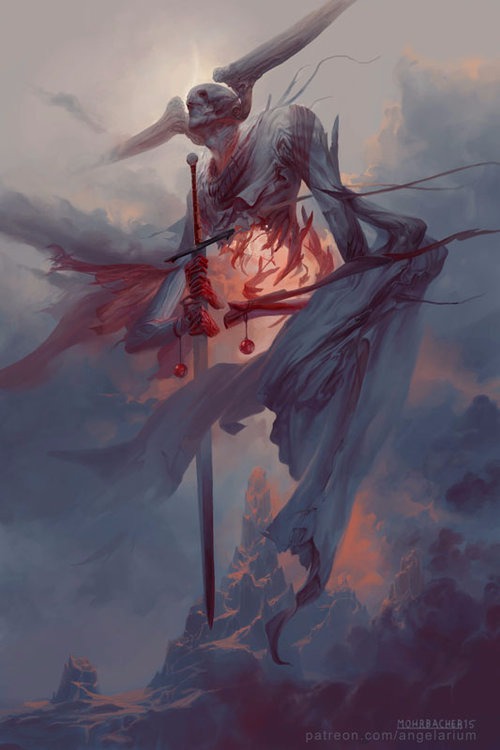
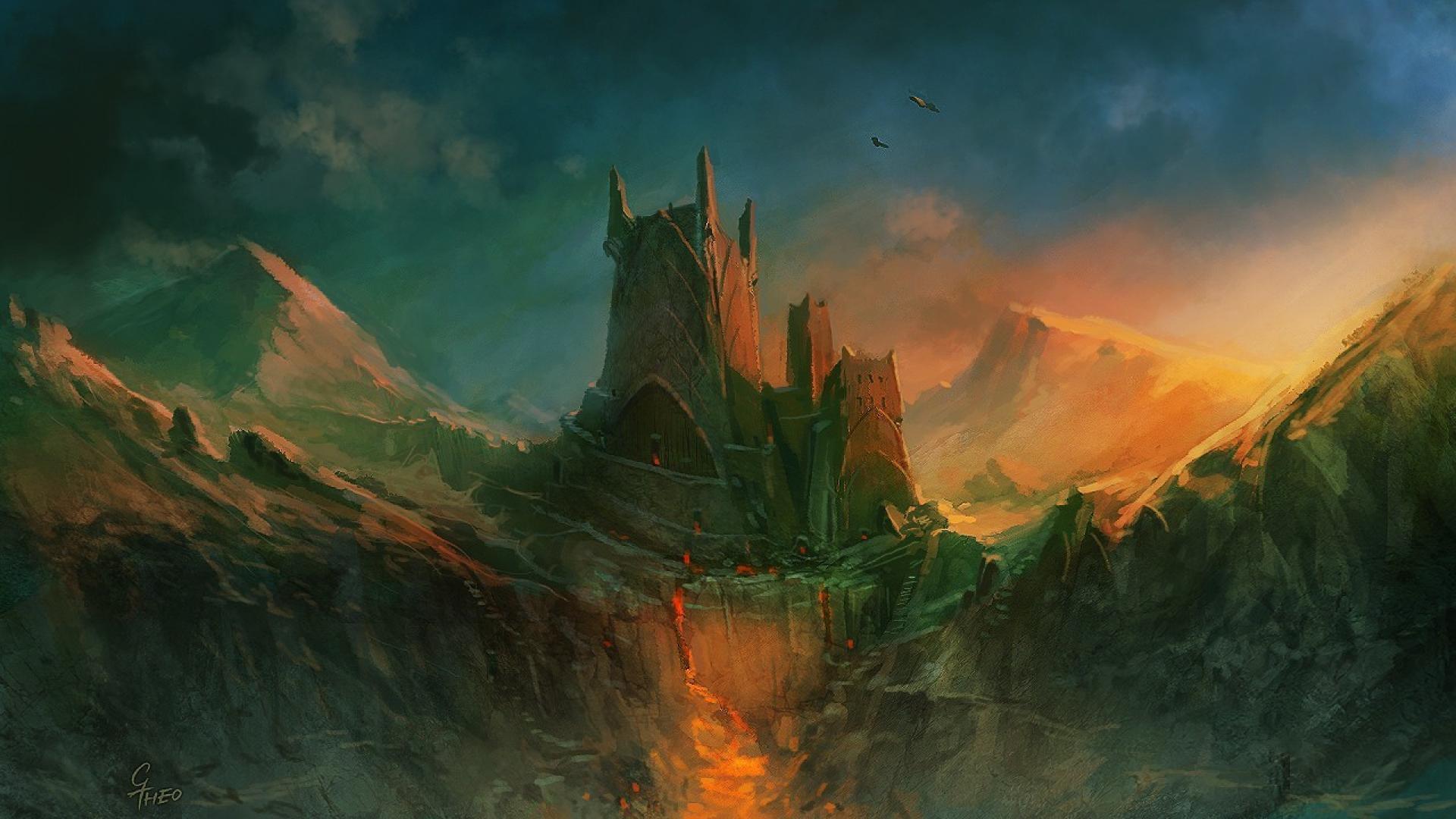

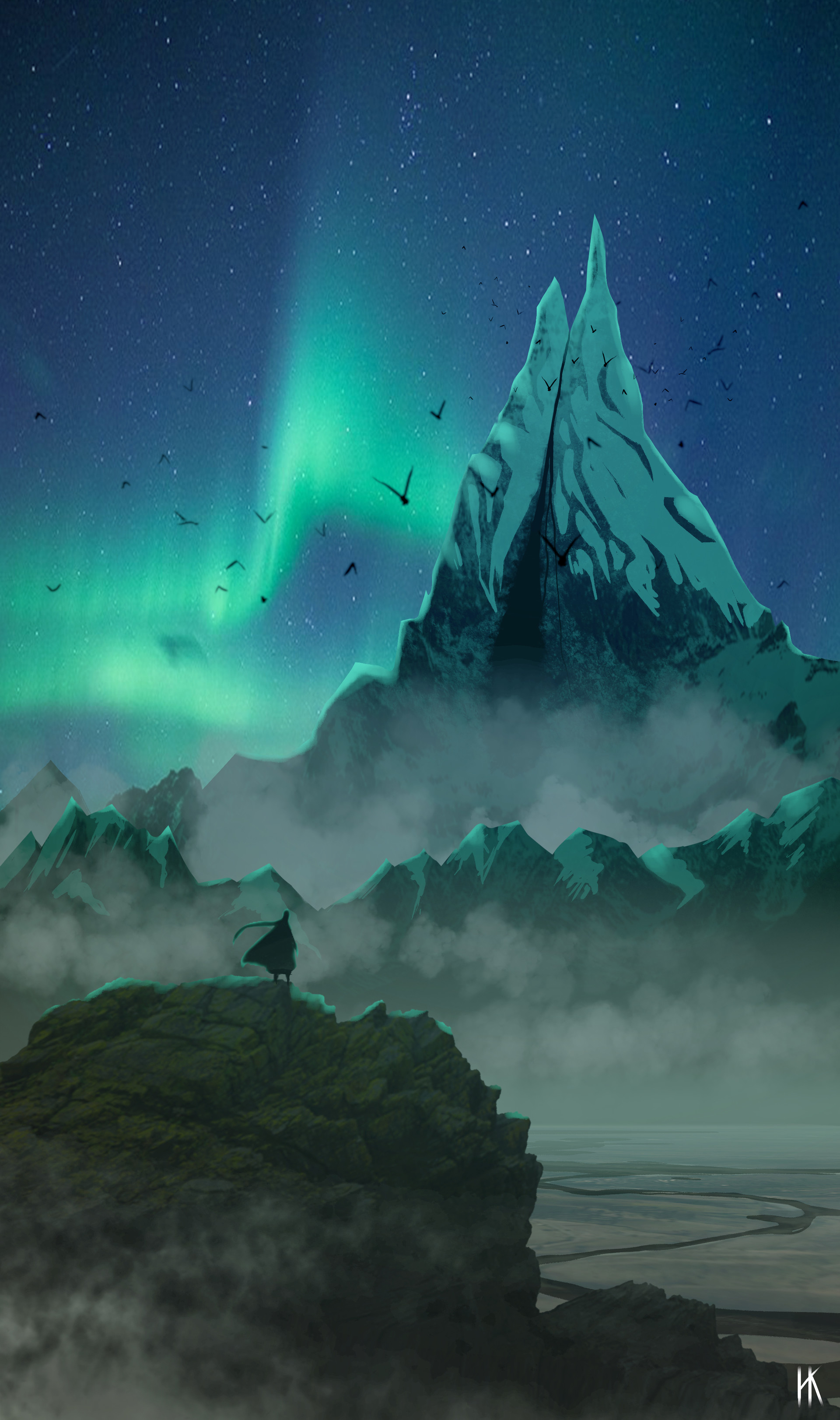

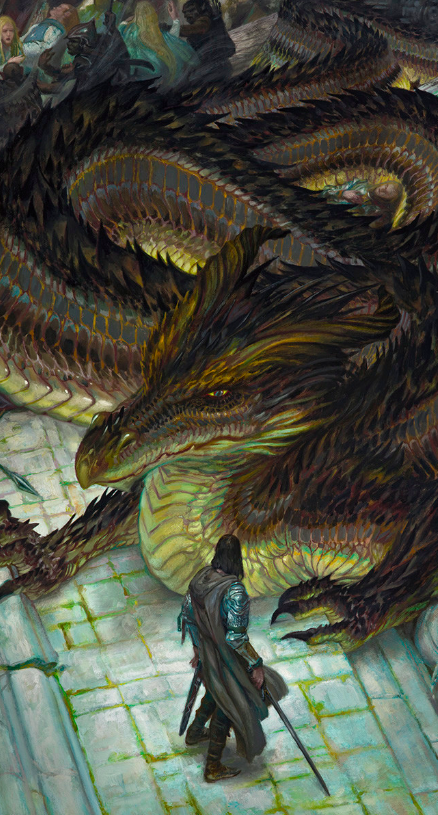
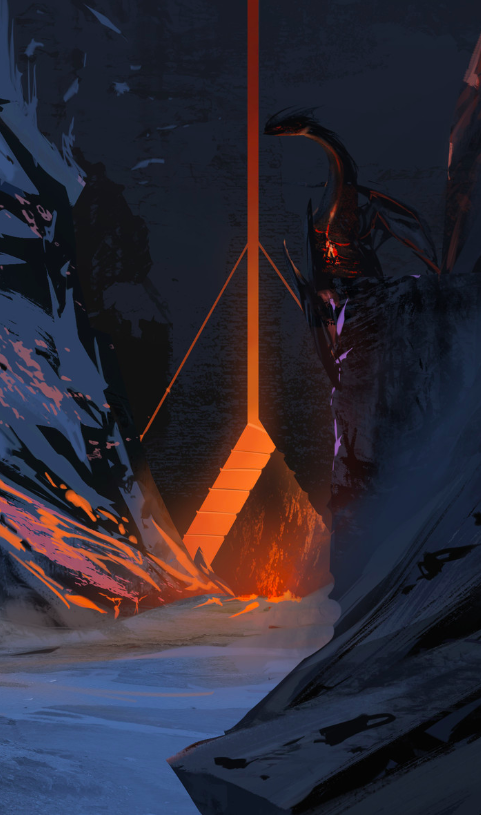

Comments